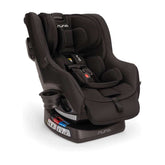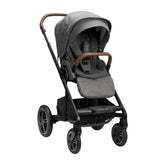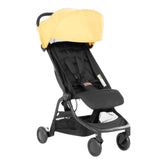5 Signs Your Baby Is Sick and How to Help Them Feel Better

It’s normal to feel anxious when your baby is sick, especially if you’re a first-time parent. Sometimes it’s hard to know when to give it a few days and when it’s serious enough to seek medical attention. Either way, you’ll want to know how to help your little one feel better and heal as quickly as possible. Remember, it’s always okay to give your pediatrician a call if you’re worried and wondering. Let’s take a closer look at a few ways how to know if your baby is sick and how you can help them get better faster and more comfortably.
Signs Baby is Sick
Infants younger than two months old who have a fever (rectal temperature higher than 100.4° F) need immediate medical attention, even if they seem to be well and show no other symptoms of illness. Excessive inconsolable fussiness, refusal to eat, coughing, and excessive drowsiness may also indicate a medical emergency at this age.
Fever is typically a sign that your little one is fighting an infection. In older babies, fevers are usually harmless and even considered a good sign, since it indicates their immune system has kicked in and is trying to heal the body. Observing other symptoms and behavior can also help you decide what to do if your baby is sick and help you evaluate how severe their illness may be.
1. Activity Level
- Encouraging symptoms: Your baby sleeps and plays in their usual way.
- Alarming symptoms: Baby seems fussier when they’re up and wants to sleep more than they normally do.
- Indications that severe illness is possible: Your baby is lethargic (difficult to wake) and doesn’t want to play.
2. Appetite
- Encouraging symptoms: Your baby has an appetite and wants to eat or drink.
- Alarming symptoms: Baby will eat or drink something if offered but takes only a few bites or sips.
- Indications that severe illness is possible: Your little one refuses all foods and liquids.
3. Urination
- Encouraging symptoms: Your baby is more than a week old and soaks six to eight diapers per day with pale yellow urine.
- Alarming symptoms: Your baby’s urine is dark yellow and less frequent than usual.
- Indications that severe illness is possible: Your baby has very little urine, saliva, or tears when they cry.
4. Cry
- Encouraging symptoms: Your infant’s cries sound normal for them.
- Alarming symptoms: Baby seems to whimper a lot. They’re hard to comfort, and their cry seems almost whiny.
- Indications that severe illness is possible: Your baby seems inconsolable. Their cry sounds weak, and they continue to fuss even when comforted.
5. Appearance
- Encouraging symptoms: Your baby looks energetic, active, and alert.
- Alarming symptoms: Your baby seems dull-eyed and lethargic and has little interest in what’s going on around them.
- Indications that severe illness is possible: Your infant has a blank stare, seems confused, or appears glassy-eyed.

If you’re wondering, “Is my baby sick?” and all of their symptoms fall into the “encouraging” category, you can be somewhat reassured that, for now, your baby is probably not seriously ill. That said, their condition may change so continue to monitor your child’s condition frequently. If your baby has any “alarming” symptoms, give your pediatrician a call and seek their guidance on how to proceed. When your baby has “indications that severe illness is possible,” make an appointment for them to be seen as quickly as possible.
When you contact your pediatrician, try to provide details about your child’s symptoms, when they became ill, and any medications you’ve given. Remember, it’s okay to ask questions and to have information repeated for clarity. A baby who is unconscious, has trouble breathing, or is very pale or blue in color requires immediate medical attention, and you should call 911.
ANB Baby Recommends FridaBaby Sick Day Kit
FridaBaby Sick Day Kit contains the tools you need to fight whatever's ailing your kiddo, all in one grab-and-go package. Suck out those stubborn boogers with NoseFrida the SnotSucker. Give baby the right dose of medicine, with MediFrida the Accu-Dose Pacifier. Clean snotty noses on the go with BreatheFrida the SnotWiper + soothe congested airways with BreatheFrida the Vapor Rub chest balm.

What to Do When Your Baby Is Sick: Treating Specific Symptoms
Whether their symptoms are serious or mild, you’ll want to help your infant feel better as quickly and as comfortably as possible. Here’s what to do when your baby is sick.
Fever
To help ease your baby’s discomfort, you can administer acetaminophen (consult your pediatrician beforehand and confirm the exact dosage), dress them in light clothing, and urge feedings as usual. Never apply rubbing alcohol on your child to treat fever. Rubbing alcohol can be absorbed into the skin or inhaled, causing serious medical issues, such as a coma. Again, call the doctor for a newborn with a fever of 100.4 degrees Fahrenheit or higher. For older babies (younger than 1 year), call the doctor if their fever is 102 degrees Fahrenheit or higher or if a fever (even a low-grade one) lasts more than three days.
Diarrhea and vomiting
Dehydration is the main trouble with diarrhea and vomiting, so give your baby plenty of fluid. If they're over the age of 1, offer small, frequent doses of an electrolyte drink starting half an hour after they vomit. Start with a tablespoon, slowly increasing the amount over time. If your sick baby has a high fever, shows signs of dehydration (few wet diapers, lethargy), or if there is any pus or blood or pus in the stool or vomit, call your pediatrician right away.
Ear pain
A baby who tugs on their ears and has a stuffy nose and fever may be suffering from an ear infection. Many ear infections clear up on their own, but some require antibiotics. A doctor will have to look inside your child’s ear to properly diagnose whether or not an infection is present. They may advise you to give it a few days to see if symptoms improve. Doctors have gotten less aggressive about treatment in recent years to avoid the overuse of antibiotics, but they may recommend infant acetaminophen to help your baby feel more comfortable.
Runny nose and congestion
Use saline drops and a suction device to help loosen and remove any nasal secretions. Dry air worsens congestion, so run a humidifier in your baby's room during sleep. Run a hot shower for 10 to 15 minutes with the bathroom door closed, then sit in the steamy room with your little one and allow the moistened air to help loosen congestion. Keep your baby hydrated by encouraging regular feedings. For babies older than one year, an electrolyte drink like Pedialyte may also be hydrating. Keep an eye out for severe coughing, wheezing, or breathing problems, and contact your doctor if they arise.
ANB Baby Recommends Safety 1st Smart Humidifier, White / Wood
The Safety 1st Smart Humidifier, White / Wood is a cutting-edge home appliance designed to enhance your indoor air quality and create a healthier and more comfortable environment for you and your family. This advanced humidifier combines innovative features with user-friendly controls to provide optimal performance and convenience. With its sleek and modern design, the Safety 1st Smart Humidifier seamlessly blends into any room decor. It boasts a compact size that allows for easy placement on a tabletop or desk, making it perfect for bedrooms, living rooms, nurseries, or home offices. The neutral color scheme ensures it complements a variety of interior styles.










